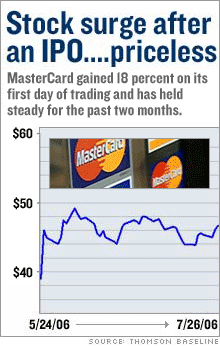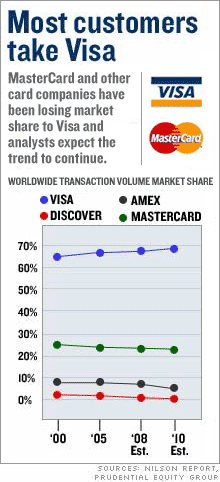|
Wall Street gives credit to MasterCard Stock Spotlight: MasterCard shares have charged nearly 20% higher since May's IPO. But litigation concerns cast a shadow on the stock. NEW YORK (CNNMoney.com) -- It's been just over two months since MasterCard shrugged off the shackles of private ownership to emerge as the biggest, and one of the most highly touted, initial public offerings of the year. So far, investors are basking in the company's post-IPO glow.
MasterCard's (Charts) stock is up almost 20 percent from its offering price - not bad considering that many on Wall Street are becoming increasingly concerned about a slowing economy and what that might mean for consumer spending. With its well-known brand name and global network, analysts are betting that MasterCard is in a sweet spot as credit cards and debit cards continue to gain popularity among consumers. MasterCard already facilitates more than 25 percent of total credit and debit card transaction volume worldwide, and has about 750 million cards in circulation - second only to privately held competitor Visa. Now all eyes are on MasterCard as it gets set to announce its first earnings report since going public on August 2. Analysts expect the company to generate $801 million in sales for the second quarter and earnings per share of 62 cents. But despite the fanfare over the company's successful IPO, MasterCard faces some serious challenges ahead. A cloud of litigation MasterCard is facing two major court battles. The first is a long-standing dispute with merchants that accuse it and Visa of colluding with member banks to set high interchange fees, which are processing fees that merchants pay to card issuers within MasterCard's and Visa's networks. Merchants contend the two companies set inflated fees with the banks, leaving merchants with little choice but to pay more in order to accept both cards in their stores. However, neither MasterCard nor Visa book revenue from the interchange fees, and analysts said that could help their case in court. The fact that MasterCard is now an independent public entity and no longer a company owned by a consortium of banks could also take some bite out of the argument that MasterCard is engaging in price-fixing. But Ryan Batchelor, an equity analyst at Morningstar, said MasterCard is far more vulnerable to a lawsuit filed by American Express and Discover Card. In 2004, MasterCard and Visa lost a landmark case before the Supreme Court. The case overturned rules that had previously banned banks from issuing cards from rivals like American Express and Discover. Subsequently, American Express and Discover filed lawsuits against MasterCard and Visa to recover billions of dollars in revenue they say was lost due to these prior anti-competitive practices. "The Supreme Court ruling creates precedence," Batchelor said, which could persuade another court to compel MasterCard to pay billions in lost revenue to AmEx and Discover. Batchelor estimates that MasterCard may have to eventually make $1.75 billion in payments related to the two cases. The company said in a recent SEC filing that it had not set aside reserves for these cases yet, but in its IPO filing MasterCard said it planned on using $650 million of the proceeds from its stock offering for legal purposes. Pricing pressure imminent? Analysts are also worried that MasterCard may come under pressure from big banks to cut its fees. Moshe Orenbuch, analyst at Credit Suisse, said that concerns about the merchant lawsuits could lead to a reduction in interchange fees for big card issuers like Citibank, Bank of America (Charts) and Capital One (Charts). That could propel the big banks to force MasterCard into lowering so-called assessment fees, which MasterCard charges issuers in order to use its brand name, as well as MasterCard's actual fees for processing transactions. Assessment fees made up 34 percent of MasterCard's total net revenues in 2005 while operation fees - which include authorization fees as well as currency conversion fees - accounted for the remainder of sales. "MasterCard is no longer majority-owned by banks and their voting control is gone,'" Orenbuch said. "It's possible that banks won't view them as partners in the same way as before and try to squeeze them for price concessions." And merchants are becoming increasingly vocal in their dissatisfaction with the payments system. That's prompted MasterCard to begin offering more rebates to larger merchants in order to keep them from filing lawsuits, Goldman Sachs analyst Elizabeth Grausam said in a research note. MasterCard's rebates to merchants increased by 64 percent in 2005. For this reason, Grausam said she was cautious about revenue growth going forward. "We have little evidence that this trend will abate in the near future," she said, adding that Visa's recent launch of an incentive network for merchants should fuel more competitive pressures. Wall Street divided So are investors overly bullish about MasterCard's prospects? Analysts are divided. Several have initiated coverage of the stock with "Hold" or "Neutral" ratings and one even issued a "Sell" on MasterCard. But Morningstar's Batchelor said that the company's pristine balance sheet (it has little debt and $1.3 billion in cash that makes it attractive.) Analysts at both Goldman Sachs and Prudential Equity Group are also standing behind the stock. Goldman has a 12-month price target of $51, while Prudential Equity Group issued a price target of $56. MasterCard currently trades at about $46.50. Matthew Park, an analyst with Prudential, estimated in a recent research note that MasterCard's sales should increase by 12 percent in 2006 and 2007 as it takes advantage of growth opportunities in the U.S. and abroad. And the stock looks reasonably valued. It is trading at about 15 times 2007 earnings estimates. Analysts expect profits to increase by 19 percent next year. The company is also in the unique position of having no direct publicly-traded competitors, so there is some scarcity value associated with the stock. Visa is a private company while Discover is a unit of Morgan Stanley (Charts). American Express (Charts) is both a card network and issuer - putting it in a different category from MasterCard, which doesn't actually issue cards. But Credit Suisse's Orenbuch said the number of unknowns, including the mountain of litigation the company faces, are significant. He said the potential fallout from settling the lawsuits could shave $7 off of the company's stock price. With a price target of $43 on MasterCard, Orenbuch said it may be a good idea to proceed with caution. ------------------------------------------------------------ None of the analysts quoted in the story own shares of MasterCard. Goldman Sachs, however, has an investment banking relationship with the company and Prudential provided non-investment banking services to MasterCard in the last 12 months. Credit Suisse served as an underwriter on the company's IPO. |
|



